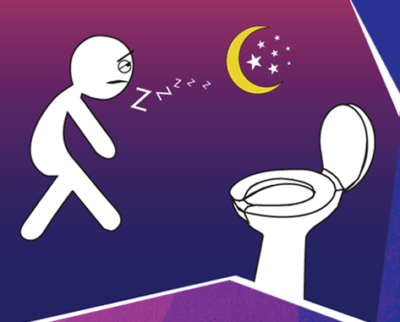CATERGORY: REJUVENATE PROSTATE
Frequent Night-time Urination
Is your sleep interrupted by the urge to urinate? This condition is called nocturia. Half of men 50 and older rise from sleep to urinate at least occasionally; after 70, half of men experience nocturia two or more times per night. This is troublesome when coupled with difficulty returning to sleep.
There are three common causes for nocturia:
• Prostate Enlargement - after age 50, many men experience benign (non-cancerous) growth of prostate tissue surrounding their urethra. The resulting pressure on the urethra leads to difficulty in emptying the bladder and more frequent urination.
• Obstructive Seep Apnea (OSA) - the upper airway repeatedly pinches close during the night. This interrupts breathing and reduces oxygen supply to the brain. Men with OSA frequently awaken and use the opportunity to go to the bathroom. OSA can also trigger hormonal changes that increase urine production.
• Night-Time Fluid Release - fluid builds up during the day in the legs. Then when you lied to sleep with your legs elevated, the fluid gets released and finds it way to the bladder leading to the urge to urinate.
Other reasons for nocturia include medication side effects, diabetes, heart disease, and urinary tract infection. If are experiencing nocturia, then start by keeping a detailed record for 2 or 3 days of when and how much you urinate. Note down if you are experiencing:
• Incomplete emptying - sensation of not emptying your bladder completely after you finished urinating.
• Intermittency - when stream starts and stops several times during urination.
• Urgency - difficulty delaying urination or holding it until you reach the bathroom.
• Weak Stream - urine steam is weaker than usual. It may just “dribble” during urination.
• Straining - having to push or strain to begin urination.
This will help your doctor identify possible causes and suggest appropriate solutions. Typically BPH makes you urinate small to moderate amounts throughout a 24-hour period (both daytime and nighttime). In contrast, sleep apnea and fluid release tend to cause heavier urine production during sleep hours.
Also you can minimise night-time urination by not drinking caffeinated or alcoholic beverages in the evenings and restricting fluids after dinner. And elevate your legs in the evening while you read or watch television to help the body to drain away excess fluid. If your regular medications have nocturia side effects, then ask your doctor to change them if possible.



